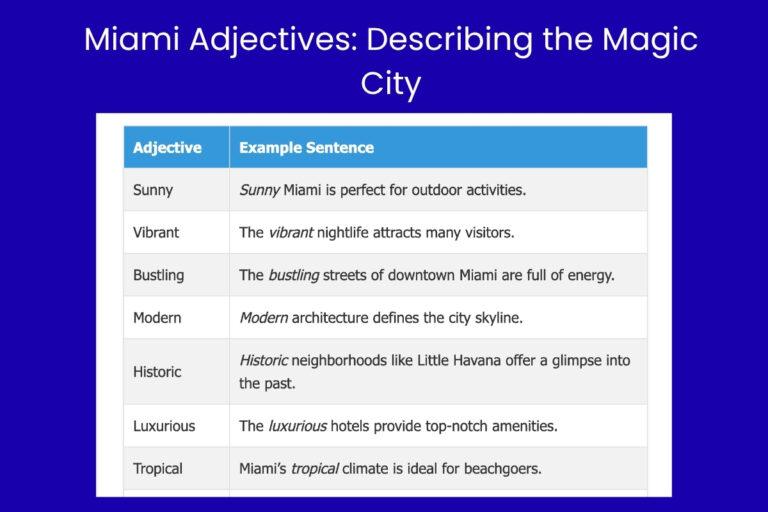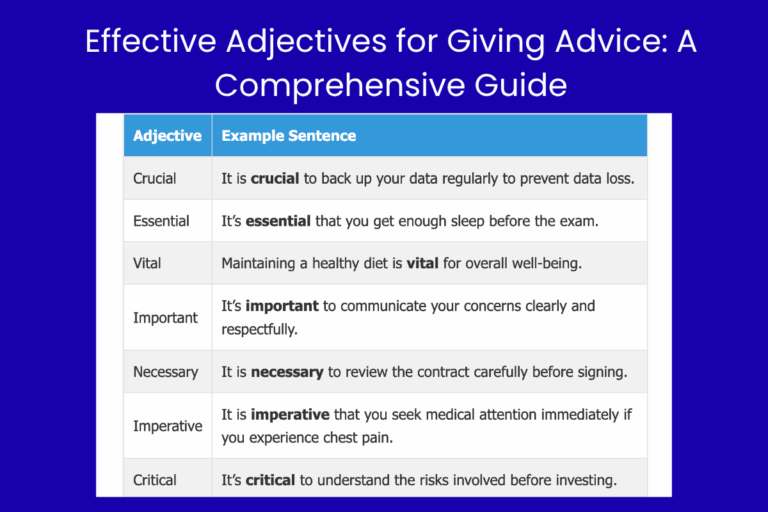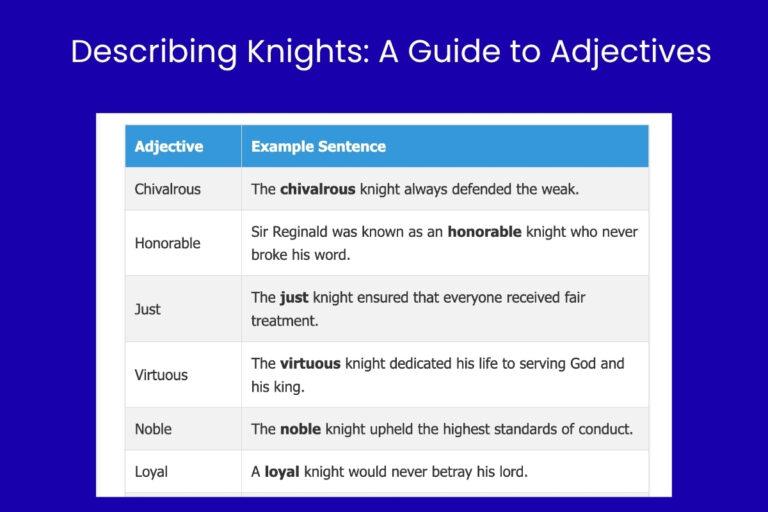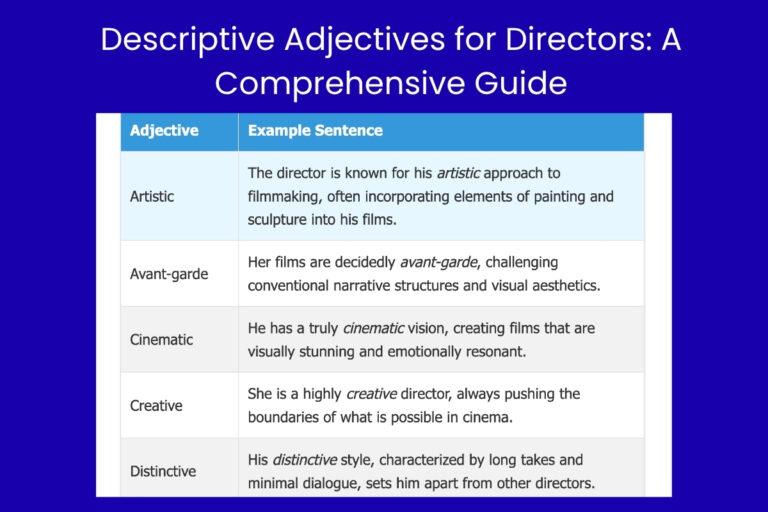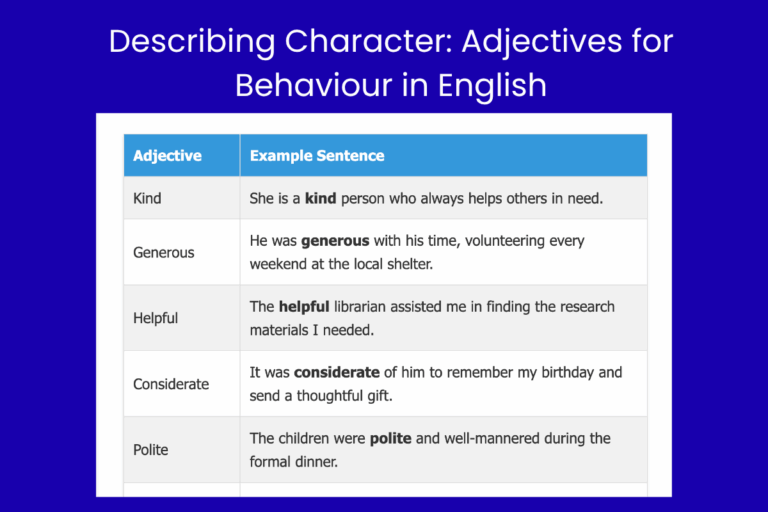Adjectives for Thursday: Describing the Fourth Day
Adjectives are the descriptive powerhouses of the English language. They bring nouns to life, adding color, detail, and specificity to our sentences. Understanding how to use adjectives effectively, especially when referring to specific days like Thursday, can significantly enhance your writing and speaking skills. This article delves into the world of adjectives for Thursday, exploring their various forms, functions, and usage rules. Whether you’re a beginner or an advanced learner, this guide will provide you with the knowledge and practice you need to master this essential aspect of English grammar.
This article is designed to benefit anyone who wants to improve their English grammar skills, particularly in the context of using adjectives to describe and modify nouns associated with Thursday. From students learning the basics to professionals aiming for more precise communication, understanding the nuances of adjective usage will undoubtedly enhance your ability to express yourself clearly and effectively.
Table of Contents
- Definition of Adjectives for Thursday
- Structural Breakdown
- Types and Categories of Adjectives for Thursday
- Examples of Adjectives for Thursday
- Usage Rules for Adjectives
- Common Mistakes with Adjectives
- Practice Exercises
- Advanced Topics
- Frequently Asked Questions
- Conclusion
Definition of Adjectives for Thursday
An adjective is a word that modifies a noun or pronoun, providing more information about it. When we talk about “adjectives for Thursday,” we’re referring to adjectives used to describe nouns or pronouns related to the day Thursday. These adjectives can describe the characteristics of a Thursday, such as the weather, events, feelings, or activities associated with that day. Adjectives help paint a more vivid picture and provide specific details about Thursday, making our communication more precise and engaging.
Adjectives play a crucial role in enriching our language. They allow us to express nuances and subtleties that would be impossible without them. In the context of Thursday, adjectives enable us to differentiate between a typical Thursday and a special one, a productive Thursday and a lazy one, or a sunny Thursday and a rainy one. Understanding how to use adjectives effectively is essential for clear and expressive communication.
Structural Breakdown
The structure of adjective usage is relatively straightforward. Adjectives usually appear before the noun they modify, but they can also follow a linking verb (such as is, are, was, were, seems, appears, becomes). The position of the adjective influences the emphasis and flow of the sentence. When multiple adjectives are used, they typically follow a specific order, which we will explore in more detail later.
For example, in the sentence “It was a busy Thursday,” the adjective “busy” precedes the noun “Thursday” and describes its nature. In the sentence “Thursday was productive,” the adjective “productive” follows the linking verb “was” and describes the state of Thursday. Both structures are grammatically correct, but they convey slightly different nuances.
Types and Categories of Adjectives for Thursday
Adjectives can be classified into several types based on their function and meaning. Here are some common types of adjectives that can be used to describe Thursday:
Descriptive Adjectives
Descriptive adjectives describe the qualities or characteristics of a noun. They answer the question “What kind?” or “Which one?” Examples include: busy, relaxing, exciting, typical, unusual, wonderful, dreadful.
Quantitative Adjectives
Quantitative adjectives indicate the quantity or amount of the noun. Examples include: every, each, some, many, few, several. Note that these are less commonly used directly with “Thursday” but can modify nouns associated with Thursday activities (e.g., “several meetings on Thursday”).
Demonstrative Adjectives
Demonstrative adjectives point out specific nouns. Examples include: this, that, these, those. For example, “This Thursday is important” or “That Thursday was memorable.”
Possessive Adjectives
Possessive adjectives show ownership or belonging. Examples include: my, your, his, her, its, our, their. These are less directly applicable to “Thursday” itself, but can relate to activities or feelings associated with it (e.g., “My Thursday was exhausting”).
Interrogative Adjectives
Interrogative adjectives are used in questions. Examples include: which, what, whose. For example, “Which Thursday are you referring to?” or “What Thursday are we meeting?”
Proper Adjectives
Proper adjectives are formed from proper nouns. While there isn’t a direct proper adjective for “Thursday,” you might use phrases implying origin (e.g., “The Thursday tradition”).
Examples of Adjectives for Thursday
Here are some examples of how adjectives can be used to describe Thursday, categorized for clarity:
General Examples
The following table provides general examples of adjectives modifying “Thursday” in various contexts. These examples aim to showcase the versatility of adjectives in describing the day of the week.
| Adjective | Example Sentence |
|---|---|
| Busy | It was a busy Thursday filled with meetings and deadlines. |
| Quiet | The office was unusually quiet on Thursday afternoon. |
| Productive | I had a very productive Thursday and completed all my tasks. |
| Relaxing | After a long week, I enjoyed a relaxing Thursday evening. |
| Typical | It was just a typical Thursday, nothing special happened. |
| Unusual | We had an unusual Thursday with unexpected visitors. |
| Wonderful | It was a wonderful Thursday, full of joy and laughter. |
| Dreadful | I had a dreadful Thursday with many problems to solve. |
| Long | It was a long Thursday, and I couldn’t wait for the weekend. |
| Short | The short Thursday felt like it ended too quickly. |
| Eventful | It was an eventful Thursday with many exciting things happening. |
| Uneventful | The day was uneventful, with nothing much to report. |
| Difficult | I faced a difficult Thursday at work with challenging projects. |
| Easy | It was an easy Thursday, and I finished all my tasks early. |
| Stressful | The stressful Thursday made me look forward to the weekend even more. |
| Calm | It was a calm Thursday, perfect for focusing on important tasks. |
| Hectic | The office was hectic on Thursday morning with everyone rushing around. |
| Slow | It was a slow Thursday, and time seemed to drag on. |
| Fast | The fast Thursday flew by, and I didn’t get everything done. |
| Memorable | It was a memorable Thursday that I will always cherish. |
| Forgotten | It was a forgotten Thursday, nothing special happened. |
| Exciting | We had an exciting Thursday with a surprise announcement. |
| Boring | It was a boring Thursday, nothing interesting happened. |
| Tiring | It was a tiring Thursday, I felt exhausted by the end of the day. |
| Refreshing | It was a refreshing Thursday, I felt great. |
Thursday Activities
This table illustrates adjectives used to describe activities that might take place on a Thursday. These adjectives add detail and context to the actions or events occurring on that specific day.
| Adjective | Example Sentence |
|---|---|
| Important | We had an important presentation on Thursday morning. |
| Regular | The regular Thursday meeting was canceled this week. |
| Special | We planned a special Thursday event for the team. |
| Mandatory | The mandatory Thursday training session is fully booked. |
| Optional | The optional Thursday workshop is a great opportunity to learn. |
| Challenging | We tackled a challenging project on Thursday afternoon. |
| Rewarding | The rewarding Thursday project was finally completed. |
| Productive | The productive Thursday workshop yielded great results. |
| Unproductive | The unproductive Thursday meeting wasted a lot of time. |
| Successful | The successful Thursday campaign boosted sales significantly. |
| Failed | The failed Thursday attempt taught us valuable lessons. |
| Intensive | The intensive Thursday course required a lot of focus. |
| Leisurely | The leisurely Thursday walk helped me relax. |
| Serious | We had a serious Thursday discussion about the company’s future. |
| Fun | The fun Thursday activity boosted team morale. |
| Educational | The educational Thursday seminar was very useful. |
| Competitive | The competitive Thursday game was very intense. |
| Collaborative | The collaborative Thursday project was a success. |
| Creative | The creative Thursday workshop was inspiring. |
| Strategic | The strategic Thursday planning session was crucial. |
| Unique | The unique Thursday event was unforgettable. |
| Innovative | The innovative Thursday proposal was well received. |
| Informative | The informative Thursday lecture was very insightful. |
| Engaging | The engaging Thursday discussion was fascinating. |
Thursday Feelings
This table presents adjectives used to describe feelings or emotions experienced on a Thursday. These adjectives add a personal and emotional dimension to the description of the day.
| Adjective | Example Sentence |
|---|---|
| Happy | I felt happy on Thursday after receiving good news. |
| Sad | I felt sad on Thursday because of a personal issue. |
| Excited | I was excited about the upcoming Thursday event. |
| Anxious | I felt anxious about the Thursday deadline. |
| Calm | I felt calm and relaxed on Thursday morning. |
| Stressed | I was stressed about the Thursday presentation. |
| Tired | I felt tired after a long Thursday at work. |
| Energetic | I felt energetic and ready to tackle Thursday’s challenges. |
| Motivated | I was motivated to complete my tasks on Thursday. |
| Discouraged | I felt discouraged after a setback on Thursday. |
| Optimistic | I was optimistic about Thursday’s prospects. |
| Pessimistic | I felt pessimistic about completing everything on Thursday. |
| Grateful | I felt grateful for the support I received on Thursday. |
| Disappointed | I was disappointed by the outcome of Thursday’s meeting. |
| Hopeful | I felt hopeful about the future after Thursday’s progress. |
| Inspired | I felt inspired after the Thursday workshop. |
| Content | I felt content with how Thursday went. |
| Frustrated | I felt frustrated by the delays on Thursday. |
| Overwhelmed | I felt overwhelmed by the workload on Thursday. |
| Peaceful | I felt peaceful on Thursday evening. |
| Refreshed | I felt refreshed after a break on Thursday afternoon. |
| Nostalgic | I felt nostalgic on Thursday, reminiscing about old times. |
| Apprehensive | I felt apprehensive about the upcoming Thursday deadline. |
| Relieved | I felt relieved after finishing a project on Thursday. |
Thursday Weather
This table provides adjectives describing weather conditions on a Thursday. These adjectives add sensory detail to the description, allowing for a more immersive experience.
| Adjective | Example Sentence |
|---|---|
| Sunny | It was a sunny Thursday, perfect for a walk in the park. |
| Rainy | It was a rainy Thursday, so I stayed indoors. |
| Cloudy | It was a cloudy Thursday, with a chance of showers. |
| Windy | It was a windy Thursday, making it difficult to cycle. |
| Stormy | It was a stormy Thursday, with thunder and lightning. |
| Cold | It was a cold Thursday, so I wore a warm coat. |
| Warm | It was a warm Thursday, ideal for outdoor activities. |
| Hot | It was a hot Thursday, and I needed to stay hydrated. |
| Humid | It was a humid Thursday, making everything feel sticky. |
| Dry | It was a dry Thursday, with no rain in sight. |
| Clear | It was a clear Thursday, with bright blue skies. |
| Overcast | It was an overcast Thursday, with a gray sky. |
| Foggy | It was a foggy Thursday morning, making visibility poor. |
| Misty | It was a misty Thursday, with a light drizzle. |
| Freezing | It was a freezing Thursday, with temperatures below zero. |
| Pleasant | It was a pleasant Thursday, with mild weather. |
| Unpredictable | It was an unpredictable Thursday, with changing weather. |
| Mild | It was a mild Thursday, not too hot or cold. |
| Severe | It was a severe Thursday, with extreme weather conditions. |
| Calm | It was a calm Thursday, with no wind or rain. |
| Breezy | It was a breezy Thursday, with a gentle wind. |
| Chilly | It was a chilly Thursday, requiring a light jacket. |
| Raw | It was a raw Thursday, with a damp and penetrating cold. |
| Balmy | It was a balmy Thursday, with a warm and gentle breeze. |
Thursday Events
This table showcases adjectives used to describe events that occur on a Thursday. These adjectives provide insight into the nature and significance of these events.
| Adjective | Example Sentence |
|---|---|
| Important | The important Thursday meeting will determine the project’s future. |
| Annual | The annual Thursday conference is always well-attended. |
| Special | We are hosting a special Thursday dinner to celebrate. |
| Unexpected | We had an unexpected Thursday visit from the CEO. |
| Scheduled | The scheduled Thursday maintenance will disrupt services. |
| Cancelled | The cancelled Thursday event disappointed many attendees. |
| Successful | The successful Thursday launch boosted company morale. |
| Unsuccessful | The unsuccessful Thursday trial led to further testing. |
| Public | The public Thursday lecture is open to everyone. |
| Private | The private Thursday gathering is for invited guests only. |
| Formal | The formal Thursday gala requires elegant attire. |
| Informal | The informal Thursday get-together is a relaxed affair. |
| Local | The local Thursday market offers fresh produce. |
| National | The national Thursday holiday is celebrated across the country. |
| International | The international Thursday summit addresses global issues. |
| Critical | The critical Thursday decision will affect the entire organization. |
| Significant | The significant Thursday announcement changed the company’s direction. |
| Minor | The minor Thursday adjustment improved efficiency. |
| Recurring | The recurring Thursday problem requires immediate attention. |
| Unique | The unique Thursday exhibition showcased innovative designs. |
| Traditional | The traditional Thursday ceremony is a cultural highlight. |
| Modern | The modern Thursday conference explored cutting-edge technologies. |
| Historic | The historic Thursday landmark attracts many tourists. |
| Current | The current Thursday situation demands careful consideration. |
Usage Rules for Adjectives
Using adjectives correctly involves following certain rules to ensure clarity and grammatical accuracy.
Adjective Order
When using multiple adjectives before a noun, they generally follow a specific order: opinion, size, age, shape, color, origin, material, purpose. This order isn’t always rigid, but it’s a helpful guideline.
For example, instead of saying “a material old brown wooden table,” you would say “a beautiful old brown wooden table”.
Comparative and Superlative Forms
Adjectives can be used to compare nouns. Comparative adjectives compare two nouns (e.g., “Thursday is busier than Wednesday”). Superlative adjectives compare three or more nouns (e.g., “Thursday is the busiest day of the week”).
For most one-syllable adjectives, add “-er” for the comparative and “-est” for the superlative. For longer adjectives, use “more” and “most” (e.g., “Thursday is more productive than Tuesday”; “Thursday is the most productive day of the week”).
Articles with Adjectives
When using adjectives before a noun, remember to use the correct article (“a,” “an,” or “the”). Use “a” before consonant sounds and “an” before vowel sounds (e.g., “a busy Thursday,” “an uneventful Thursday”). Use “the” when referring to a specific Thursday (e.g., “The Thursday meeting was very productive”).
Common Mistakes with Adjectives
Here are some common mistakes people make when using adjectives:
- Incorrect: “Thursday was more better than Wednesday.” Correct: “Thursday was better than Wednesday.” (Avoid using “more” with adjectives that already have “-er” endings.)
- Incorrect: “A interesting Thursday.” Correct: “An interesting Thursday.” (Use “an” before vowel sounds.)
- Incorrect: “Busy Thursday.” Correct: “A busy Thursday.” (Usually, a singular countable noun needs an article.)
- Incorrect: “Thursday is most busiest day.” Correct: “Thursday is the busiest day.” (Use ‘the’ before superlative adjectives.)
- Incorrect: “I had a very tiring, stressful, long, productive Thursday.” Correct: “I had a very long, stressful, tiring, productive Thursday.” (While the order may not always be strict, consider a more natural flow.)
Practice Exercises
Test your understanding of adjectives with these exercises:
Exercise 1: Identifying Adjectives
Identify the adjectives in the following sentences:
| Question | Answer |
|---|---|
| 1. It was a cold Thursday morning. | cold |
| 2. The important Thursday meeting was postponed. | important |
| 3. I had a relaxing Thursday evening. | relaxing |
| 4. This Thursday is going to be busy. | busy |
| 5. We are planning a special Thursday event. | special |
| 6. That Thursday was unforgettable. | unforgettable |
| 7. Every Thursday, we have a team meeting. | every |
| 8. Which Thursday are you referring to? | which |
| 9. The productive Thursday session yielded great results. | productive, great |
| 10. It was an eventful Thursday. | eventful |
Exercise 2: Using Adjectives Correctly
Fill in the blanks with appropriate adjectives to describe Thursday:
| Question | Answer |
|---|---|
| 1. It was a very ______ Thursday, full of surprises. | eventful/exciting |
| 2. I prefer a ______ Thursday to a busy one. | quiet/relaxing |
| 3. The ______ Thursday deadline is fast approaching. | important/critical |
| 4. After a long week, I look forward to a ______ Thursday evening. | peaceful/calm |
| 5. We had an ______ Thursday with several unexpected issues. | unusual/difficult |
| 6. This ______ Thursday feels different from the others. | particular/certain |
| 7. It was the ______ Thursday of the year. | last |
| 8. The ______ Thursday market is a local favorite. | weekly |
| 9. I had a ______ Thursday, I completed all my tasks. | productive |
| 10. It was a ______ Thursday, I felt great. | refreshing |
Exercise 3: Ordering Adjectives
Rearrange the adjectives in the correct order:
| Question | Answer |
|---|---|
| 1. (old, wooden, beautiful) A ______ Thursday table. | beautiful old wooden |
| 2. (busy, important) An ______ Thursday meeting. | important busy |
| 3. (long, tiring) A ______ Thursday shift. | long tiring |
| 4. (interesting, short) An ______ Thursday lecture. | interesting short |
| 5. (eventful, exciting) An ______ Thursday adventure. | exciting eventful |
| 6. (large, new) A ______ Thursday project. | new large |
| 7. (difficult, challenging) A ______ Thursday task. | challenging difficult |
| 8. (calm, peaceful) A ______ Thursday evening. | peaceful calm |
| 9. (sunny, warm) A ______ Thursday afternoon. | warm sunny |
| 10. (old, historic) An ______ Thursday building. | historic old |
Advanced Topics
For advanced learners, here are some more complex aspects of adjective usage:
Participle Adjectives
Participles (verb forms ending in -ing or -ed) can function as adjectives. For example, “a tiring Thursday” (present participle) or “a planned Thursday event” (past participle).
Compound Adjectives
Compound adjectives are formed by combining two or more words, often hyphenated. For example, “a well-planned Thursday” or “a stress-free Thursday.”
Frequently Asked Questions
- What is the main function of an adjective?
The main function of an adjective is to modify or describe a noun or pronoun, providing more information about its qualities, characteristics, or attributes. Adjectives help to make our language more specific and vivid.
- Can I use multiple adjectives to describe the same noun?
Yes, you can use multiple adjectives to describe the same noun. However, it’s important to follow the general order of adjectives to ensure clarity and a natural flow in your writing. Remember the order: opinion, size, age, shape, color, origin, material, and purpose.
- Do adjectives always come before the noun they modify?
While adjectives typically come before the noun they modify (e.g., “a busy Thursday”), they can also follow a linking verb such as “is,” “are,” “was,” “were,” “seems,” or “appears” (e.g., “Thursday was busy”).
- How do I form comparative and superlative adjectives?
For most one-syllable adjectives, add “-er” for the comparative form and “-est” for the superlative form (e.g., busy, busier, busiest). For longer adjectives, use “more” for the comparative and “most” for the superlative (e.g., productive, more productive, most productive).
- What are demonstrative adjectives and how do I use them?
Demonstrative adjectives (this, that, these, those) point out specific nouns. “This Thursday” refers to a Thursday close in time or context, while “that Thursday” refers to a Thursday further away. “These” and “those” are used for plural nouns.
- What is a participle adjective?
A participle adjective is a verb form (ending in -ing or -ed) that functions as an adjective. For example, “a tiring Thursday” (tiring is the present participle) or “a planned Thursday event” (planned is the past participle).
- Can nouns be used as adjectives?
Yes, nouns can sometimes function as adjectives. For example, in the phrase “Thursday meeting,” the noun “Thursday” modifies the noun “meeting,” indicating which meeting is being referred to.
- What are compound adjectives and how are they formed?
Compound adjectives are formed by combining two or more words, often hyphenated. For example, “a well-planned Thursday” or “a stress-free Thursday.” Hyphens are used to show that the words function as a single adjective.
Conclusion
Mastering the use of adjectives, particularly in the context of describing days like Thursday, is crucial for effective communication in English. By understanding the different types of adjectives, their proper usage, and common mistakes to avoid, you can significantly enhance your writing and speaking skills. Remember to pay attention to adjective order, comparative and superlative forms, and the correct use of articles.
Continue practicing and experimenting with adjectives to expand your vocabulary and improve your ability to express yourself clearly and vividly. With consistent effort, you’ll become more confident and proficient in using adjectives to bring your descriptions of Thursday, and any other subject, to life. Keep exploring, keep learning, and keep
practicing!

